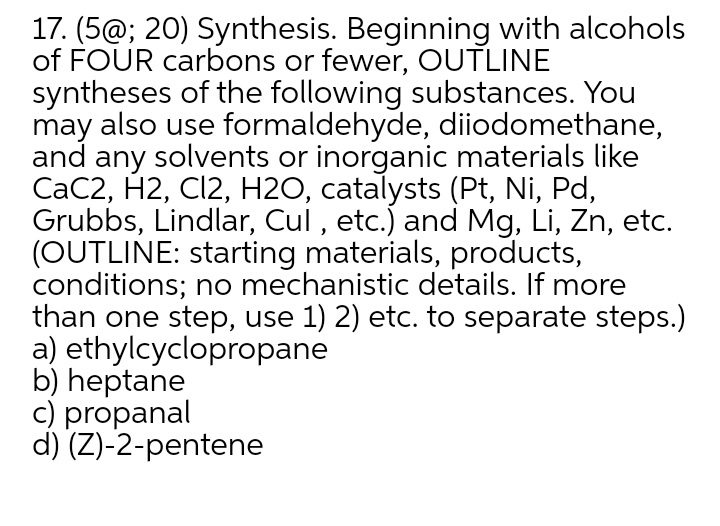17. (5@; 20) Synthesis. Beginning with alcohols of FOUR carbons or fewer, OUTLINE syntheses of the following substances. You may also use formaldehyde, diiodomethane, and any solvents or inorganic materials like CaC2, H2, C12, H2O, catalysts (Pt, Ni, Pd, Grubbs, Lindlar, Cul , etc.) and Mg, Li, Zn, etc. (OUTLINE: starting materials, products, conditions; no mechanistic details. If more than one step, use 1) 2) etc. to separate steps.) a) ethylcyclopropane b) heptane c) propanal d) (Z)-2-pentene
17. (5@; 20) Synthesis. Beginning with alcohols of FOUR carbons or fewer, OUTLINE syntheses of the following substances. You may also use formaldehyde, diiodomethane, and any solvents or inorganic materials like CaC2, H2, C12, H2O, catalysts (Pt, Ni, Pd, Grubbs, Lindlar, Cul , etc.) and Mg, Li, Zn, etc. (OUTLINE: starting materials, products, conditions; no mechanistic details. If more than one step, use 1) 2) etc. to separate steps.) a) ethylcyclopropane b) heptane c) propanal d) (Z)-2-pentene
Organic Chemistry
8th Edition
ISBN:9781305580350
Author:William H. Brown, Brent L. Iverson, Eric Anslyn, Christopher S. Foote
Publisher:William H. Brown, Brent L. Iverson, Eric Anslyn, Christopher S. Foote
Chapter5: Alkenes: Bonding, Nomenclature, And Properties
Section: Chapter Questions
Problem 5.31P
Related questions
Question

Transcribed Image Text:17. (5@; 20) Synthesis. Beginning with alcohols
of FOUR carbons or fewer, OUTLINE
syntheses of the following substances. You
may also use formaldehyde, diiodomethane,
and any solvents or inorganic materials like
CaC2, H2, Cl2, H2O, catalysts (Pt, Ni, Pd,
Grubbs, Lindlar, Cul , etc.) and Mg, Li, Zn, etc.
(OUTLINE: starting materials, products,
conditions; no mechanistic details. If more
than one step, use 1) 2) etc. to separate steps.)
a) ethylcyclopropane
b) heptane
c) propanal
d) (Z)-2-pentene
Expert Solution
This question has been solved!
Explore an expertly crafted, step-by-step solution for a thorough understanding of key concepts.
This is a popular solution!
Trending now
This is a popular solution!
Step by step
Solved in 2 steps with 2 images

Knowledge Booster
Learn more about
Need a deep-dive on the concept behind this application? Look no further. Learn more about this topic, chemistry and related others by exploring similar questions and additional content below.Recommended textbooks for you

Organic Chemistry
Chemistry
ISBN:
9781305580350
Author:
William H. Brown, Brent L. Iverson, Eric Anslyn, Christopher S. Foote
Publisher:
Cengage Learning

Macroscale and Microscale Organic Experiments
Chemistry
ISBN:
9781305577190
Author:
Kenneth L. Williamson, Katherine M. Masters
Publisher:
Brooks Cole

Organic Chemistry
Chemistry
ISBN:
9781305580350
Author:
William H. Brown, Brent L. Iverson, Eric Anslyn, Christopher S. Foote
Publisher:
Cengage Learning

Macroscale and Microscale Organic Experiments
Chemistry
ISBN:
9781305577190
Author:
Kenneth L. Williamson, Katherine M. Masters
Publisher:
Brooks Cole